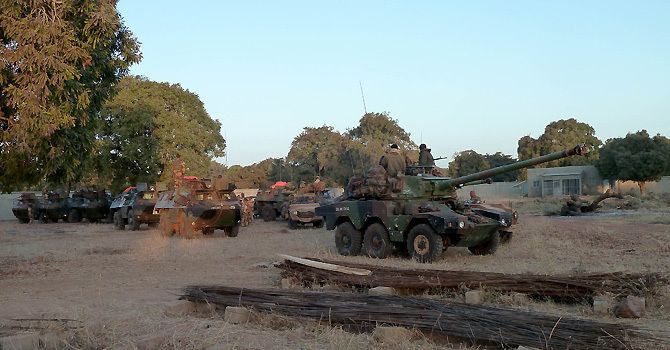French-led troops were closing in on Mali’s fabled desert city of Timbuktu on Sunday after capturing a string of other towns in their offensive against Islamist groups in the north of the country.
A reconnaissance team has reached the edge of Timbuktu, a senior Malian officer said, adding that French and Malian soldiers were approaching the city “without meeting any resistance”.
France’s defence ministry said one of its armoured battalions and Malian troops were headed toward the ancient trading post and centre of Islamic learning, where 333 revered Muslim saints are believed to be buried.
The advance comes after French and Malian soldiers on Saturday seized the town of Gao, east of Timbuktu — the biggest victory so far in their 17-day operation against the militants, who have controlled the north for 10 months.
The French defence ministry said in a statement that it had carried out some 20 air strikes Saturday and Sunday in the Gao and Timbuktu regions.
“Air operations carried out since (Saturday) are providing direct support to operations in Gao and along the western axis,” it said.
“Operations conducted deep in enemy territory are continuing, notably with the reinforcement of our position in Gao, in particular by an armoured battalion… and by the Malian armed forces and several African units, including from Niger and Chad.”
Malian forces “established a foothold” in Gao and “several terrorist groups were destroyed or chased to the north” in the battle for the city, the ministry added.
But a French military official denied an earlier report by a Malian security source that air strikes had destroyed the home of Iyad Ag Ghaly, the leader of armed Islamist group Ansar Dine (Defenders of the Faith).
“Iyad Ag Ghaly’s house is still standing,” the French source said. “There have not been any strikes in Kidal region,” the Islamist-held area in the extreme northeast where Ag Ghaly’s home is located.
Gao is the biggest of six towns seized by French and Malian troops since they launched their offensive on January 11 to wrest the vast desert north from the Islamists amid fears that the region could become a terror hotbed.
French-led forces took the city from the Al-Qaeda-linked Movement for Oneness and Jihad in West Africa (MUJAO), one of the Islamist groups that seized control of northern Mali in April last year.
The Mali crisis erupted in the chaotic aftermath of a military coup. An alliance of ethnic-Tuareg rebels seeking an independent homeland in the north joined forces with several Islamist groups, taking Kidal first and then Gao and Timbuktu.
The Islamists quickly sidelined the Tuaregs, imposing a harsh version of Islamic law which saw offenders flogged, stoned or executed.
Militants also banned music and television, forced women to wear veils and destroyed ancient religious shrines in the World Heritage site of Timbuktu.
France launched its campaign after Islamists captured a central town and threatened to advance on the capital, Bamako.
— ‘We have the feeling we will soon be liberated ‘–
Residents fleeing Timbuktu were jubilant in the face of the French advance.
“We have the feeling that we are soon going to be liberated,” said Sidi Toure, a 67-year-old trader.
Amadou Alassane Mega, a young student, said: “They beat us up when we smoked or listened to music. They will have to pay for what they did to us.”
The UN said 9,000 people had fled Mali since the launch of the French campaign, bringing the total number of refugees to 150,000, while about 230,000 are internally displaced.
At an African Union summit in Addis Ababa where leaders discussed increasing troop numbers for Mali, outgoing chairman and Benin President Thomas Boni Yayi described the AU response as slow and said France’s action was something “we should have done a long time ago to defend a member country”.
United Nations chief Ban Ki-moon told the summit he was “determined to do everything to help the people of Mali”, but also urged Bamako to ensure “an inclusive political process” and “full restoration of the constitutional order”.
Defence chiefs from West African regional grouping ECOWAS agreed Saturday to boost their troop pledges for Mali to 5,700. Chad, which is not a member of the 15-nation bloc, has promised an extra 2,000 soldiers.
France said Sunday it has now deployed 2,900 troops and that 2,700 African soldiers are currently on the ground in Mali and Niger.
French Prime Minister Jean-Marc Ayrault, who is on a tour of South America, appealed for more aid for the Mali effort.
Each country “can contribute, according to its means, to help this country and those in West Africa which are coming to its aid,” he said.










